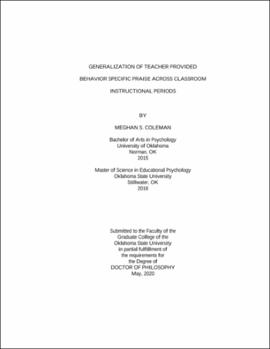| dc.contributor.advisor | Duhon, Gary J. | |
| dc.contributor.author | Coleman, Meghan S. | |
| dc.date.accessioned | 2020-09-09T20:49:21Z | |
| dc.date.available | 2020-09-09T20:49:21Z | |
| dc.date.issued | 2020-05 | |
| dc.identifier.uri | https://hdl.handle.net/11244/325458 | |
| dc.description.abstract | Lack of classroom management skills is one of the largest contributors to teacher burnout and job dissatisfaction. Teachers are often ill-equipped to handle problematic behaviors due to lack of training which can lead to displaying higher rates of punishment for undesired behaviors instead of reinforcing positive behaviors (Evertson & Weinstein, 2006). This can lead to teachers' attempts to decrease the problem behaviors only to have them increase instead (Farmer, Reinke, & Brookes, 2014). Teachers could change this by increasing positive reinforcement provided in the classroom (Evertson & Weinstein, 2006). Providing praise to a student not only rewards the student for engaging in appropriate behaviors, but also identifies to others what behaviors are appropriate (Simsonsen, et al., 2008). | |
| dc.description.abstract | The use of teacher praise is an effective intervention which can be implemented with little or no cost (Sutherland, Wehby, & Copeland, 2000). Research (Simonsen, Fairbanks, Briesch, Meyers & Sugai, 2008) has shown the use of behavior-specific praise has the strongest research-backed evidence base out of all of the well-known methods to improve classroom management. However, studies indicate the use of praise within the classroom is used infrequently in comparison to the rates the existing research recommends (Allday et al., 2012). | |
| dc.description.abstract | While much has been researched on the generalization of child behaviors, there is little research regarding the generalization of teacher behaviors. Research has shown teachers have the ability to generalize in multiple settings but do not do this automatically (Coffee & Kratochwill, 2013). Often the use of goal setting and performance feedback increases teacher generalization (Duncan, Dufrene, Sterling, & Tingstrom, 2013). | |
| dc.description.abstract | This study evaluated the generalization of teacher behaviors in an inclusive classroom across different classroom instructional periods. In this multiple baseline design, all four teachers taught in K-5 inclusive educational settings and were referred through a volunteer basis or through administrator referral. Two thirty-minute time periods during the school day were identified by teacher nomination and used in this study. Visual analysis was utilized to evaluate differences in teacher provided statements and percentage of students on-task. | |
| dc.format | application/pdf | |
| dc.language | en_US | |
| dc.rights | Copyright is held by the author who has granted the Oklahoma State University Library the non-exclusive right to share this material in its institutional repository. Contact Digital Library Services at lib-dls@okstate.edu or 405-744-9161 for the permission policy on the use, reproduction or distribution of this material. | |
| dc.title | Generalization of teacher provided behavior specific praise across classroom instructional periods | |
| dc.contributor.committeeMember | Poncy, Brian C. | |
| dc.contributor.committeeMember | Gann, Candace J. | |
| dc.contributor.committeeMember | Davis, Robert E. | |
| osu.filename | Coleman_okstate_0664D_16670.pdf | |
| osu.accesstype | Open Access | |
| dc.type.genre | Dissertation | |
| dc.type.material | Text | |
| thesis.degree.discipline | School Psychology | |
| thesis.degree.grantor | Oklahoma State University | |
